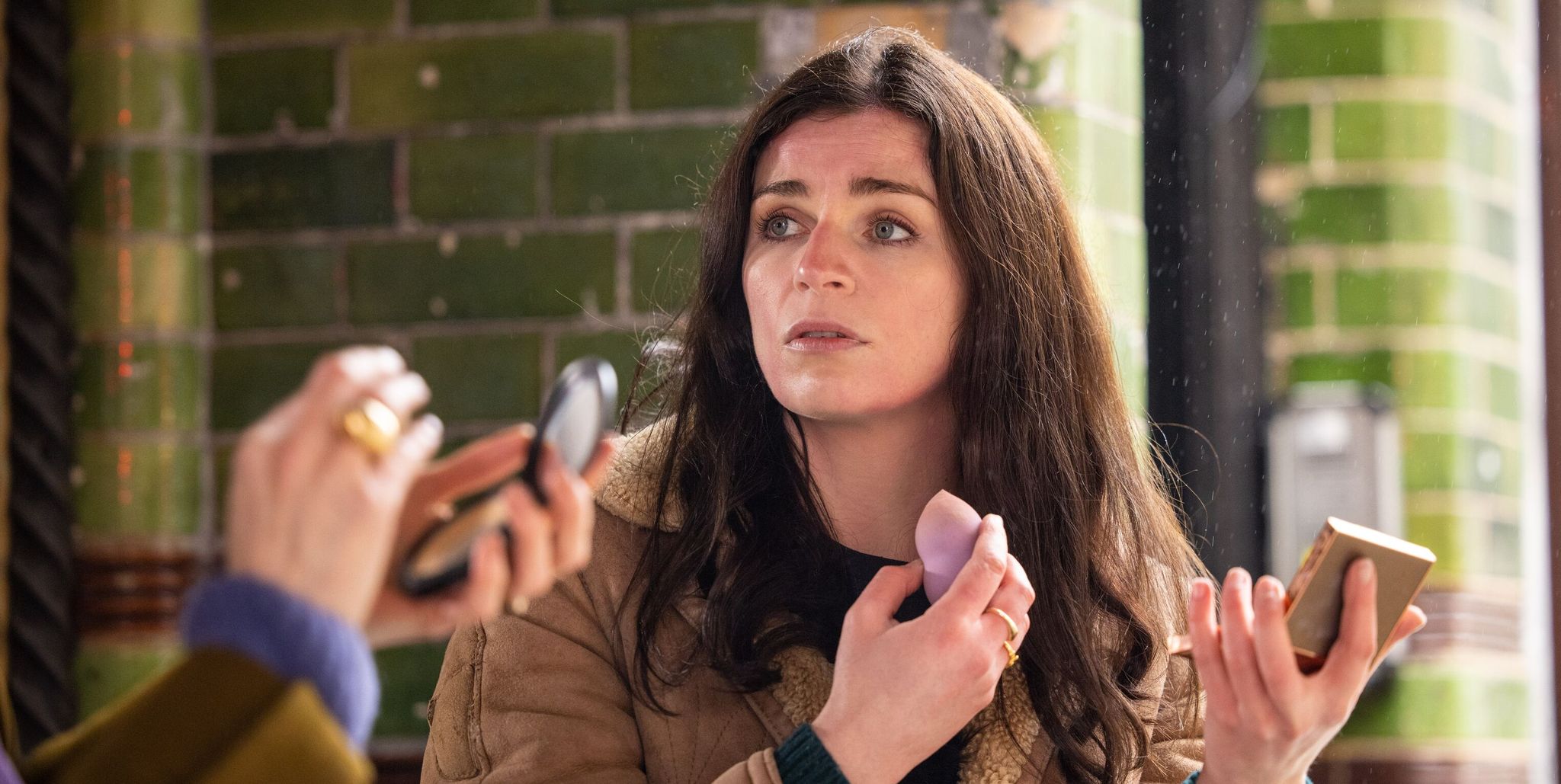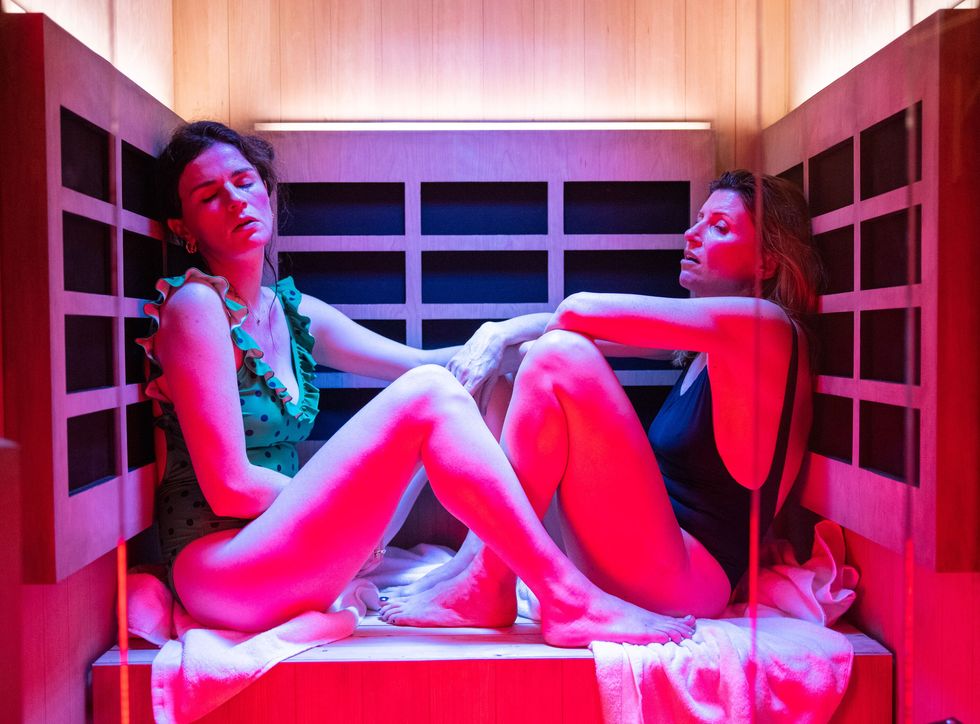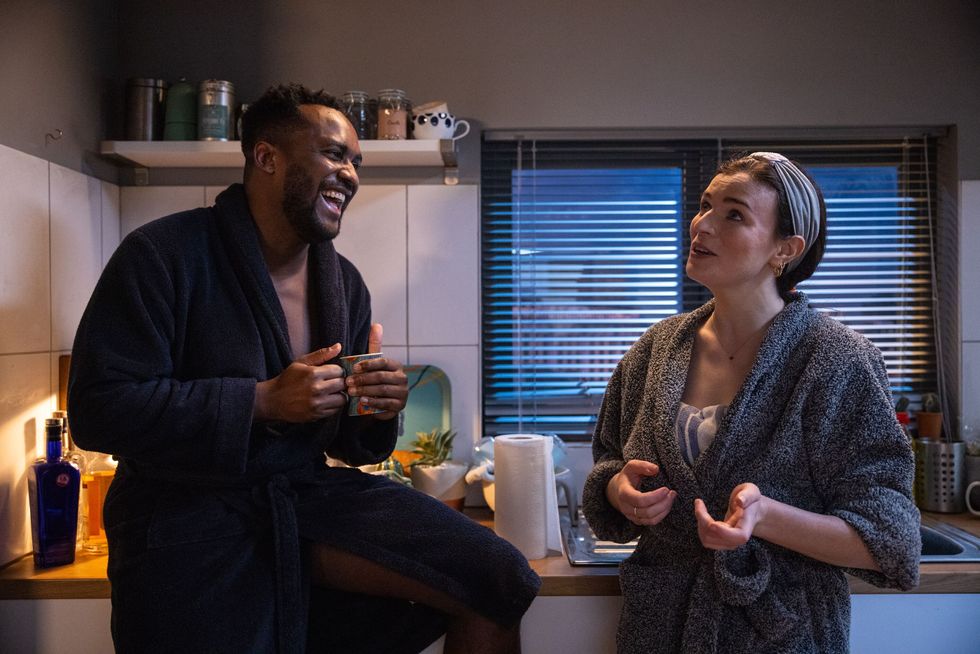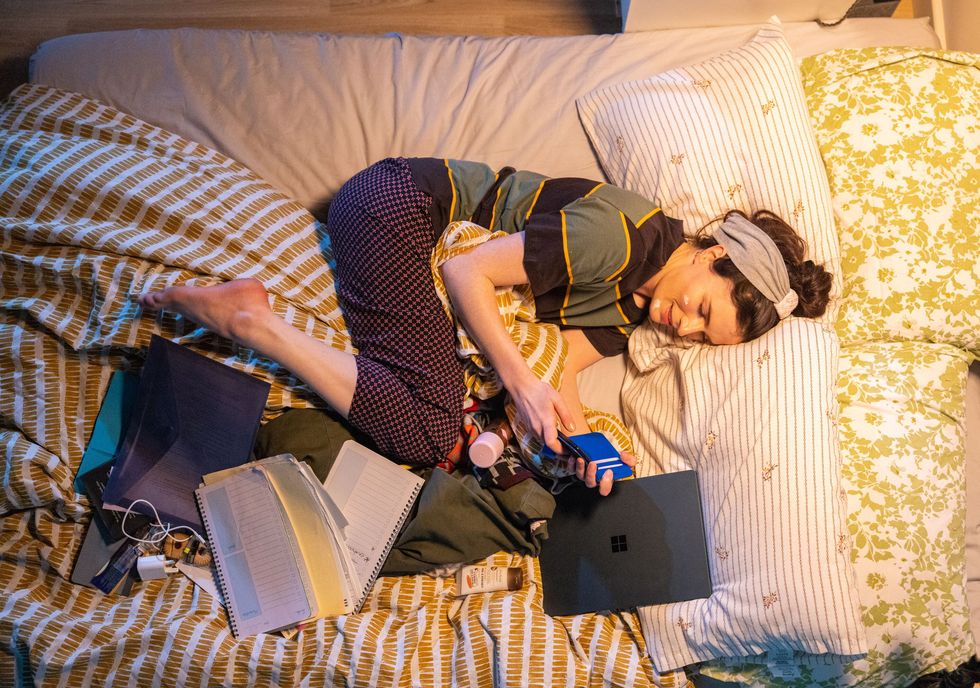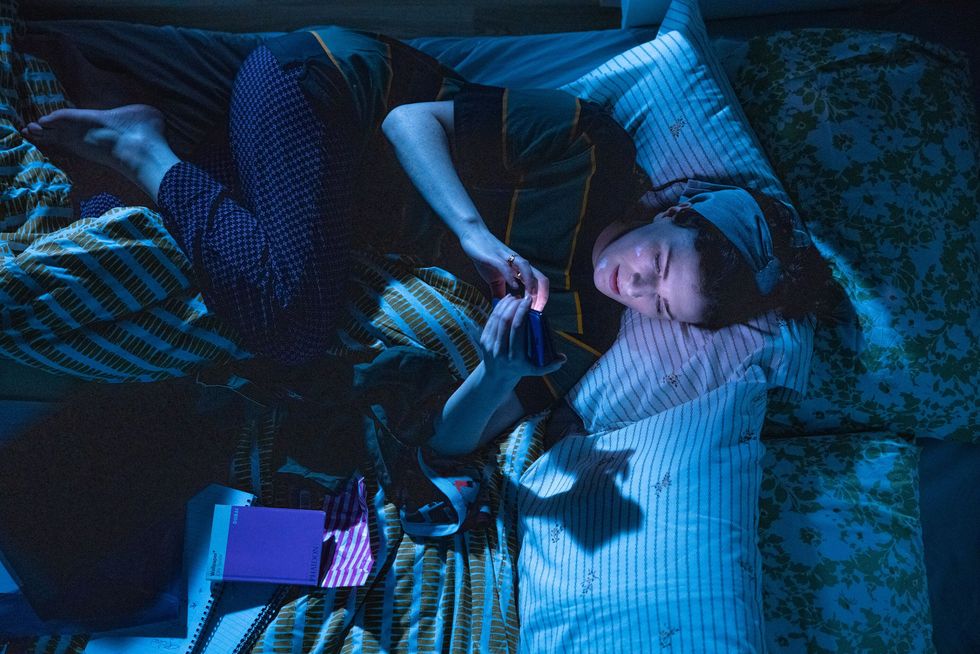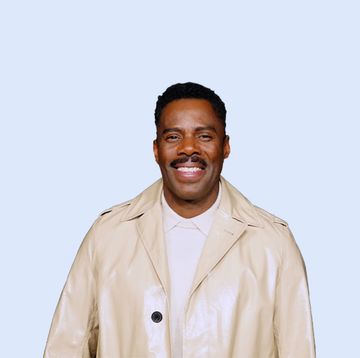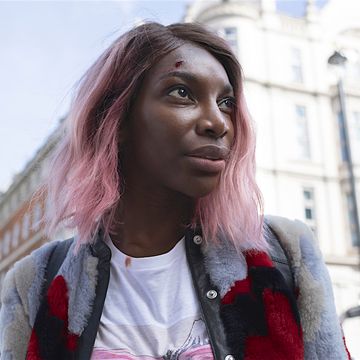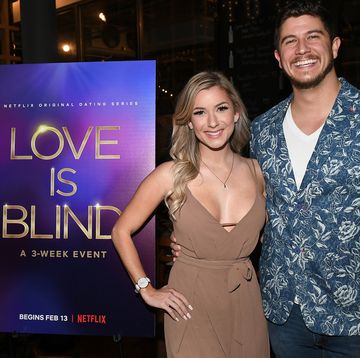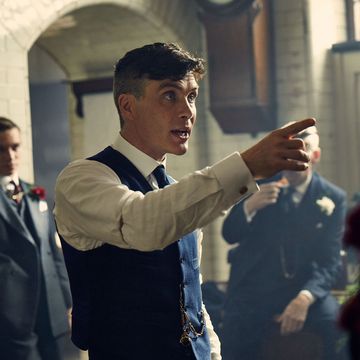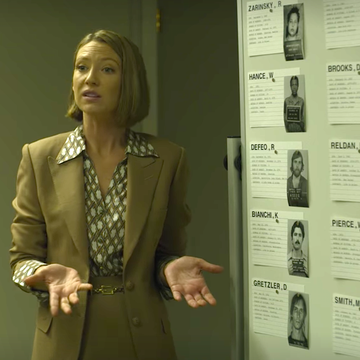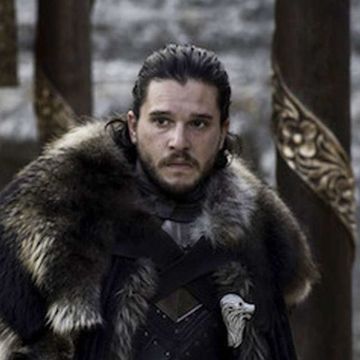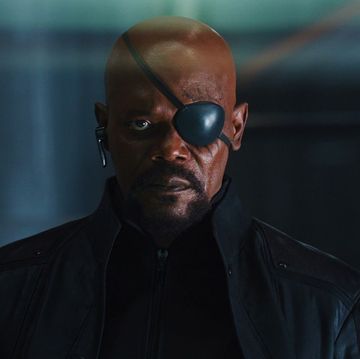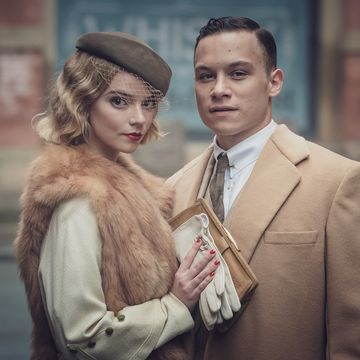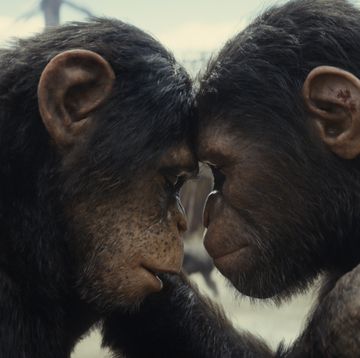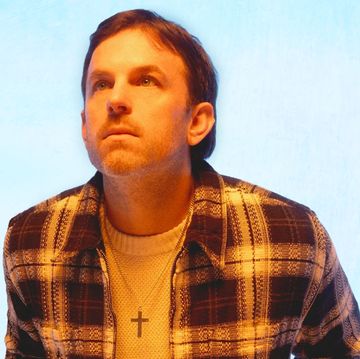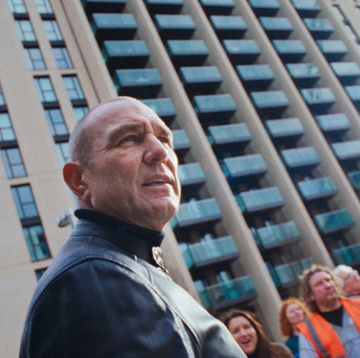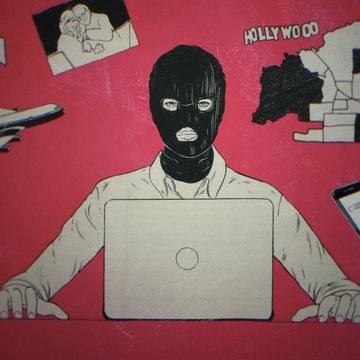Back in April, a letter came through Aisling Bea's letterbox. The handwriting was oddly familiar. Extremely familiar, in fact. It was a letter she'd written to herself 12 months before, in the teeth of the first lockdown, given to a friend who'd also written herself a letter, and which she'd completely forgotten about.
She sat down to read it, wondering what wisdom her past self had set down.
"And we were fucking delusional, let me tell you that much," Bea tells Esquire on the phone. "Wow. Wow."
The Aisling of April 2020 was sure she'd be rereading the letter having dashed off series two of This Way Up, her Bafta-winning comedy series about sisters Àine and Shona, played by Bea and Sharon Horgan, who are stumbling through the aftermath of Àine's nervous breakdown and Shona's slowly congealing relationship with her fiancé. That's not exactly what happened.
"At that time I was like, ‘Once lockdown finishes in a couple of weeks I’m gonna have the whole series written, la la la la… Cut to: 18 December, two weeks before filming, I’m about to be locked down for Christmas."
The order to isolate came just as Bea's mother was about to arrive for the festive period.
"I got such a high, I finally handed in the last draft on 18 December and I thought, ‘Thank fuck – now we have Christmas’. My mother had just made it over, I was just about to go over to my sister’s house where my mother was, and she was really the only person flying from Ireland into England, into the war zone. Literally the producer rang and was like, ‘Basically you just spend Christmas alone’. That was a bit of a kick in the tits."
Her Christmas Day was spent doing a Zoom stand-up gig for the Always Be Comedy night where she's been a regular for a decade. It was at least, she says, "great for my Catholic guilt".
The second series of This Way Up was shot over the bleakest months of the pandemic this winter and was, Bea says, "pretty grim" in spite of attempts to vibe things up with a Covid competition every Friday. "Not for the people who get the most Covid," she clarifies. "The people who are being the most Covid-aware."
"It’s one of those things where you’re like, ‘Ah, lads’. And everyone was just so worried about their loved ones as well. So I can’t lie – even though I know you’re supposed to lie to journalists – and say it was easy. ‘Oh fantastic! What morale! It was a team effort!’"
Despite being made in extremely not-fun circumstances, the second series of This Way Up is every bit as punchily funny and moving as the first. The focus has moved a little though. Where last time Àine was lonely and in the first stages of her recovery, now she's stabilised and looking upwards: starting a business, hanging out with friends, cracking on with Tobias Menzies' dishy-but-awkward widower Richard. Nonetheless, the ground beneath her feet starts to fall away.
When you talk to her, Bea flips between intense earnestness – especially when she's talking about Horgan's virtues, or her mum winning an award for her work in Irish horse-racing – and will, when things get too earnest, break into flippant, perky sarcasm.
"The fact that it’s coming out now [in July], I’m a bit like, ‘Remember the situation under which it was made! It wasn’t made in the sun! Just so you know! It was made in the dark, the dark of winter, with the airborne disease.’"
Bea has already written herself another letter for April 2022. What's in it?
"D’you know, the thing I was struck by was the amount of detail I’d put in for work in this letter, and the me a year later was more interested by how I felt. I got really annoyed at myself from 2020 that I didn’t put in any more what I was feeling, and how I’d like to feel. And you do realise as you go chasing all the work stuff, and you’re there holding your achievement or whatever you have in your own life that was the thing, you’re like, ‘Oh, the thing was supposed to feel a certain way’."
She's in a group of friends who are all artistic types who have clambered toward the tops of their fields, and most feel the same.
"So this time around I’ve focused on how I’d like to feel in a year’s time, and I hope that’s very different to the way I feel now. That would be it. Not like, ‘I’d really like a Marvel movie!!’"
She laughs. "Cut to me in a jumpsuit in a year’s time going, ‘No, actually this does feel really good. This level of success feels absolutely great'."
What do you get from stand-up that you don’t from writing for TV, and vice versa?
Oh, joy. Any sense of achievement or happiness. It’s awful – writing is awful. It’s so lonely, because it’s just me on my own. I was saying [after the first series], on the second time around I can’t do that again – I can’t be so lonely and writing so isolated and doing everything over email and not seeing people. And we were like, right, let’s really have a think about that this time around, and the government were like, noooo! But yeah, really awful. I don’t think there was a moment I enjoyed writing any of the show. I know that sounds really negative, and I hope people enjoy the show, and I’m really proud of it, and I love what I’ve made, but that doesn’t mean that it was… it was birthed in a pandemic. It’d be like asking someone, was your pregnancy good during lockdown? But with stand-up, there’s an audience there, it’s live, it’s human, it’s all the stuff that we learned we really needed.
My friend Matt said that what he misses is not his best friends, it’s the people he couldn’t give a shit about – you know, like people in the coffee shop or a friend who you’re like, ‘Yeah, I’ll stay around for another drink – so I never really asked, do you have a brother or a sister?’ Those sort of people. And actually society’s made up of incidental hellos and thank-yous, and those are the things that have been removed. That’s actually like what audiences are like – just people for the fleeting moment, and you all enjoy something as a collective. You can shit your pants as well doing it, it’s nerve-wracking, but I got back to doing it in July or August last year. You know, when we thought it was over? Ha ha. Lol! And for the first time in a long time I felt joy, doing stand-up, and craft. So that’s been one thing that’s good to come out of the last year and a half, and I’m really pulling at pork scratchings in the bottom of the bag to find any.
Loneliness is a big theme in This Way Up. What conclusions have you come to about how it works?
I suppose, no new conclusions. I don’t think there’s a new PR campaign for it. I’d done quite extensive research on what it does to the body before and it’s a subject that really interested me before I wrote the first series. I suppose for me the first series is about loneliness; the second series is more about communication. And that’s been something that’s been thrown into question this time around. How do we communicate? What do we need to communicate? We’re on a phone now, you haven’t said anything nice about my show yet, so I’m already thinking, ‘Oh right, so I’ll keep going with the interview but ultimately he hates it,’ whereas you’re like, ‘Oh I really liked it, I didn’t think to say that.’ And all those things go missing, whereas none of those things are the truth.
The whole series looks at where we miss each other in small and big ways, and the consequences that can have. Sometimes it’s because of English as your [second] language, sometimes it’s because of like, missing each other emotionally, or the language or the culture I find is a big thing that happens with me. Sometimes people perceive me as being very direct in a way that I’m not in Ireland at all direct, and I know that’s an accent and cultural thing and an ear through which people perceive me. And other times I am being quite direct. But a lot of the time I’m like, that’s interesting – is it a gendered thing? So that’s been more my theme for the second series and I definitely think it’s something we all have to work out.
We’ve probably all needed more encouragement through words because you’re not getting a little touch on the hand or a pat on the back. This series, for example, we were shooting with non-stop masks, so on a comedy it’s pretty demoralising sometimes to hear nothing. Like [from] a director or something, you’re like, ‘They didn’t say anything – oh right, so I’m a piece of shit.’ You’re an actor anyways, but you didn’t even see a smile, there’s no going over giving you a little hug at the end of the day because you’re not allowed because of an airborne virus. That’s what I found interesting in this one.
You’re a big Love Island and Real Housewives fan. Is watching them part of the process of writing?
Definitely for me, yeah. I think I find it very hard to watch things that are any way close to what I’m writing, because that way lies great madness. I think that I just like listening to characters. Actually, what you’re listening to is characters a writer didn’t write – I know they’re heavily edited, I know reality TV is formatted in its own way. But if you’re listening to other people’s characters, you can almost take on [their voice] – suddenly, Àine sounds very like Mare from Mare of Easttown, you know? Suddenly she’s got a Boston accent. And I think when I listen to what I’m listening to, it’s characters and relationships the most. And what my job is, is to take those and make them slightly more interesting and verbose, with some better jokes. So I’m not guilty about it – [in a mocking whine] ‘Is it your guilty pleasure??’ Nah, put your guilt on yourself mate, I’m fine. That and crime dramas, like Line of Duty. They don’t sit in the same place, and it’s actually quite something, to watch something so plot-entertaining.
Are you still in your big Love Island WhatsApp group with Richard Curtis and Lena Dunham?
Oh yes! I am yeah. I think it’s a bit defunct now, it’s past the heady heyday. It’s kind of like going back to a nightclub when you’re in your forties and thinking, ‘Aw I remember this being more exciting’. I think that’s kind of what it’s like now, and also people are really sick of communicating over WhatsApp. It’s like please, no more communicating via internet. Anything real, at all, is better.
Quite unusually for a comedy, Àine and Shona both enjoy and find meaning in work. Usually they’re just a shit thing a character has to do.
Yeah! I really wanted to show that. I’m from a family of teachers – jockeys and teachers – and so much of the time people are stuck in a dead-end job they hate and all that, and a someone said to me, “I’m a teacher and I love how much she loves her students, you don’t get to see that a lot.” And I’m like, ‘Oh yeah, they’re not shit, they make her day’. And my mother, she works for the Irish Jockeys Trust, and today – about an hour ago – won an award for her contribution to Irish horse-racing.
Congratulations!
Yeah! We’re over the moon. She really deserves it. I could cry if I talk about it too much, Tom, but I won’t. She lives for the jockeys she looks after. She’s like, me and [Bea's sister] Sinéad are 'my little jockeys'. Just the idea of someone who cares about teaching and cares about her students, and people are trying to make their lives better, and you’re not always trying to get out of something, you are where you want to be – that’s what I know. I absolutely love what I do, and so does my sister, and we’re all in my family quite vocational in our jobs – we give up other stuff for them. I’m kind of proud of that element, and I wanted to make sure it was there again.
There’s a line which they tried to cut out of the edit for time and I was like, 'No – I’m leaving it in' – a bit where she’s talking to Richard, and she’s like, ‘You know I really love my job?’ That’s actively there on purpose. Because also, with the issue of depression and stuff like that, people try and write things where if only the external circumstance changed then maybe they’d be OK. I’m very passionate about showing in this show – even in episode three, where her weekend sort of goes off, there was a draft where it was sort of because Richard cancelled on her, and I actively made her cancel on Richard. I wanted to show this time it’s not about the external stuff – what about when the external stuff’s fine, and nothing’s going wrong, and you are where you should be in a way, how do you get through that? So that was the MO, for want of a better word. She loves her job, everything’s going well, but she has mental health issues.
What’s the best thing about Sharon Horgan?
Probably her talent. She’s incredibly talented, and one of the most instinctive writers I’ve ever met. Such an incredible actress. There’s a scene in episode five with her and Indira [Varma, plays Shona’s colleague Charlotte] where I am bloody proud of the writing I did to be honest, but her and Indira are so fucking good in that scene. It was the only day I had to rewrite a whole episode while they were filming because there were Covid problems – someone on another show got Covid and all these sorts of things. It was real fun. I think the things that are coming out at the moment really showcase Sharon outside of being a show creator, and she’s obviously brilliant in Catastrophe, but that kind of plays to her strengths. I think a lot of the stuff coming out over the next year and a half will firmly push her into the leagues where she belongs.
What tends to happen in interviews with you is in the intro you get compared to people like Michaela Coel and Mae Martin and Phoebe Waller-Bridge, and placed as part of a generation of writers who make really funny shows that confront big issues and big emotions. Do you feel a part of a generation of writer-performers like that, or do you feel more siloed off, doing your own thing?
The word ‘generation’ feels like… you’re like, oh yeah, myself and Phoebe did Edinburgh around the same time she was doing her play, and Mae and I came up doing stand-up together, I know a lot of Michaela Coel’s friends and she was a few years below me at drama school – not the actual drama school, that era of drama school people.
I remember Sanjeev Bhaskar said to Nish Kumar when they did a set together that after The Kumars at No 42, he didn’t think it would take two generations until Nish, who’s like 20 years younger, to come through. When you watch things, they sort of have to happen to 10 and 12 year olds before the damage has been done and the world has told them, ‘You can’t do it’. And that sort of has to happen at a stage when you’re like, ‘Oh my god, if you don’t think women are funny, you’re an idiot’. Rather than, if it happens throughout your life and you have no other people to look up to, you do start thinking, 'Oh maybe that’s not the truth', and you start questioning yourself. Whereas I have no doubt in my mind that these people are idiots. It doesn’t mean that it’s not hard, and you don’t get knocked back, but there’s an internal – what’s the word? Knowledge. The one thing I’d have to say that connects us is we’re all hardy, gritty people, and are able to deal with knock-backs a lot of the time. I mean, it’s hard to deny the word ‘generation’ when we’re literally all around the same age. It’s exciting though, and they’re all people I’m inspired by and I look up to. And know; I know what they’ve been through and worked with, and it’s a lot to do. There aren’t lots of us that have written and been in our own things, and it’s a lot. Sharon did Catastrophe with Rob [Delaney]; people have a co-person.
To do it on your own – and I’m not saying you do it on your own without support and people who help – but just you as the face of it, you’re not replaceable. Sharon can do an interview, or Rob can do an interview; there’s no-one who can sub in to talk to Tom at Esquire. And then the pressure of that is so lonely, so it is a lovely thing to be able to talk to Phoebe or Michaela about how it is, your vision, who to let in, who to not let in, whose criticism to listen to and whose notes to listen to, all that kind of stuff. We get a lot of information from the groups we’re in, and the teams you’re in, and it’s such a weight of pressure to be able to spitball something. Just to have someone to knock an idea against. So to not have that is a mad madness, to try and find where you’re going to be inspired from, or to verify that you’re not going mad, or you are indeed absolutely mad.
All six episodes of This Way Up are available to stream on All4 from tonight
